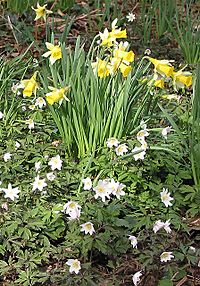Gwen and Vera's Fields facts for kids
Gwen and Vera's Fields is a small nature reserve in Gloucestershire, covering about 0.7 acres (0.28 hectares). This special place has two fields. It's looked after by the Gloucestershire Wildlife Trust, a group that protects nature. They bought it in 1987 with help from someone who wanted to stay a secret! It's even listed as a 'Key Wildlife Site' because it's so important for nature.
Contents
Where are Gwen and Vera's Fields?
Gwen and Vera's Fields is found near Newent in Gloucestershire. It's close to other important woodlands like Greenaway's Wood and Betty Daw's Wood. Betty Daw's Wood is actually part of a bigger protected area called Dymock Woods SSSI. The northern edge of the reserve touches Greenaway's Wood.
These two fields used to belong to the Forestry Commission way back in the 1920s. They were once part of a small farm called Wain Cottage. The fields were used for grazing animals and had an orchard. You can still find old apple, plum, and pear trees there today! The soil in the fields is a bit wet and made of clay.
Amazing Plants and Animals
Gwen and Vera's Fields is famous for its huge number of wild daffodils. These beautiful yellow flowers cover the fields, especially in spring. You'll also see lots of wood anemones, which are delicate white flowers that spread into the fields from the nearby woods.
Other pretty wildflowers you might spot include:
- Cowslip
- Common knapweed
- Oxeye daisy
- Perforate St John's-wort
- Wild angelica
- Meadowsweet
In the west field, you might even find meadow saffron (also known as autumn crocus) and common spotted orchid.
Because the fields are right next to a woodland, you'll find plants that like both open spaces and shady areas. Along the edges of the fields, you can see:
- Barren strawberry
- Wood spurge
- Wood avens
- Various types of ferns
The trees in the nearby woodland include oak, wild cherry, and field maple. The hedges around the reserve are made up of plants like hazel, hawthorn, blackthorn, dog rose, bramble, goat willow, and ash.
Many birds love to live in the woodland edge areas. Keep an eye out for:
- Nuthatch
- Chiffchaff
- Blackcap
Explore the Wild Daffodil Trail
The Wild Daffodil Trail is a series of walking paths that connect several nature reserves. These reserves are known for their amazing displays of wild daffodils. Gwen and Vera's Fields is one of these special places, along with Betty Daw's Wood (part of Dymock Woods SSSI), Ketford Bank, and Vell Mill Daffodil Meadow.
There are different walks you can take:
- One walk goes from Dymock to Ketford, passing through Vell Mill Meadow and Ketford Bank (about 8 miles long).
- Another walk includes Betty Daw's Wood and Gwen and Vera's Fields (about 2 miles long).
Protecting Wild Daffodils
Wild daffodils face many challenges. Their habitats can become broken up, and sometimes the areas they need are not looked after properly. Non-native plants can also invade their space. Farming methods like ploughing and using chemical fertilisers have also caused many wild daffodils to disappear over time.
How the Reserve is Cared For
To help the wildflowers grow, Gwen and Vera's Fields are managed in a traditional way. In the summer, the hay is cut, and then sheep are allowed to graze there. This helps to control tall plants and allows the wildflowers to spread and thrive.
Images for kids



